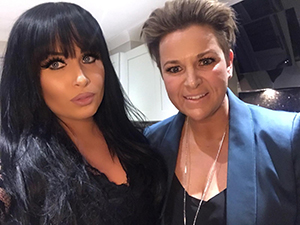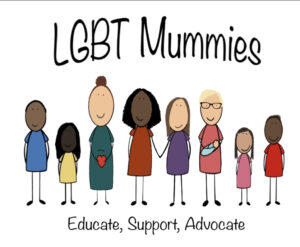We set up a support group for LGBT mums after a difficult journey to being parents
Laura-Rose talks of the isolation she and her wife Stacey have felt, both as being mothers together and when they experienced a miscarriage – and how they have used their experience to make a positive difference for other LGBT+ people.
There’s a lack of understanding about the dynamics of LGBT+ relationships and how loss can affect each person in different ways.
I have been with Stacey since 2007. We always knew we wanted children but we didn’t know any other same sex families and there was a real lack of information and support for LGBT+ women like us looking to start a family.
After five attempts, including a miscarriage at 11 weeks, we had our first child, and our second child on the second round of IUI. We are incredibly lucky that we have both been fortunate enough to carry and so are both ‘bio’ and ‘non-bio’ mothers.
When we experienced miscarriage as a couple, at the time we felt isolated and alone with no one to go to for support, no one fully understanding. Also, being a non-biological mother, I didn’t realise the impact our miscarriage would have on me emotionally. Had I had access to the Miscarriage Association all that time ago, I would have had someone to talk to about my feelings and how our loss had affected me, even though I hadn’t carried.
At the time, I didn’t know how to support my wife, what to say, how to make things better. I didn’t have the physical connection to the loss so I couldn’t comprehend her pain, yet I was going through a rollercoaster of emotions and didn’t know what I could do to make things ok again.
The fact that we knew we would continue fertility treatment made it all the more painful – knowing that we would have to start the process all over again – so we decided to take a three month break to heal before we tried again.

Laura-Rose & Stacey Thorogood
While we were starting our family, we were consistently contacted by other LGBT+ women and people, or people who had ‘friends like us’, about how we started our family. It even resulted in a very lovely nurse coming in with a pad and pen in recovery after our first born arrived to ask “I hope you don’t mind, but my friends are married and they have asked me how you went about having your baby!” Which was a funny and surreal moment! If anything, this cemented for us the fact that there was no central point or source of information and support for women looking to start a family. So, in 2018, we decided to set up LGBT Mummies.
From our work with LGBT Mummies, it is apparent that as a community we don’t openly share or talk about miscarriage and loss. When going through fertility treatment it seems to be ‘onto the next cycle we go!’ without time to digest what you have gone through, a merry-go-round of medication, scans and waiting rooms. It is apparent too, that there’s a lack of understanding about the dynamics of LGBT+ relationships and how loss can affect each person in different ways.
Having experienced miscarriage ourselves, we know how painful and isolating it can be and there needs to be further support for LGBT+ women including ‘non-bio’ mothers and parents regarding the aftermath of a miscarriage. More conversations need to be had, more stories shared so that other LGBT+ women and people do not feel alone.
The mental health support that is needed after suffering a loss is monumental in ensuring that you can try to move on to continue to create your family. Wounds take time to heal, but if organisations like ours and the M.A. collaborate, we can ensure that no LGBT+ woman or person feels they have no-one to turn to, or that there’s a lack of support, and that they can reach out and ask for help.
www.instagram.com/lgbt_mummies/

